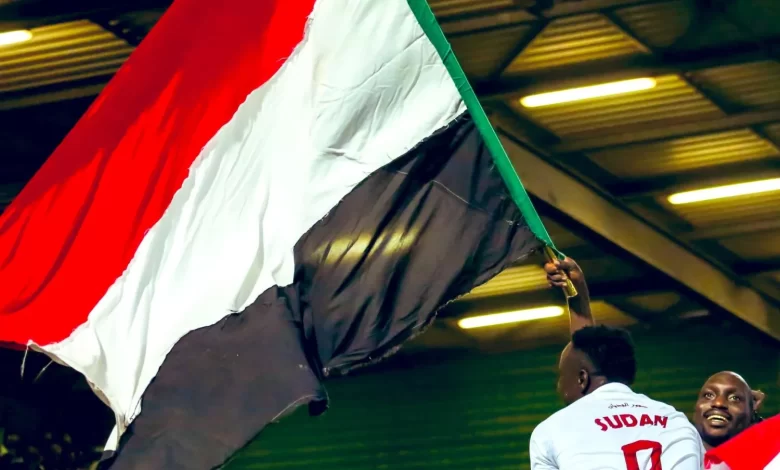Sudan’s “Falcons of Jediane”… From the “Saudi Camp” to the Dream of the World Cup

Sudan Events – Agencies
The Sudanese national team is now closer than ever to realizing the dream of qualifying for the World Cup for the first time in its history. After six rounds of the African qualifiers for the 2026 edition, the “Falcons of Jediane” sit third in Group B with 12 points, tied with Senegal in second place and trailing group leaders Congo by just one point.
Under the leadership of Ghanaian coach Kwesi Appiah, the Sudanese team has achieved three wins and three draws without a single defeat, reflecting the team’s impressive discipline and clear improvement in performance.
The team relies on a group of standout players, including the dangerous striker Mohamed Abdel Rahman and Saif Terry, whose speed and dynamism constantly threaten opponents. Additionally, midfielder Abu Aqla Abdullah provides balance and stability, effectively linking the different lines of play.
The Sudanese national team, known as the “Falcons of Jediane,” is one of the oldest and most prestigious teams in Africa. The Sudanese Football Association was established in 1936 and was one of the founding members of the Confederation of African Football (CAF) in 1957. Although the team has yet to reach a World Cup finals, their determination to achieve this milestone has grown stronger as they continue their historic campaign.
Sudan still faces four crucial matches against Senegal, Togo, Mauritania, and the Democratic Republic of Congo. Winning at least three of these matches, along with securing positive results against direct rivals, could place Sudan on the verge of direct qualification for the World Cup for the first time in its history.
In an exclusive interview with Asharq Al-Awsat, Sudan national team manager Abu Bakr Al-Mahi stressed that the journey is far from over despite the team’s current strong standing.
He noted that there are still four matches left and that the gap between Sudan and the nearest competitors is only one point.
Al-Mahi described the team’s performance so far as an “achievement,” highlighting that Sudan has surprised many by outperforming more experienced African teams, collecting 12 points without a loss. He emphasized that Sudan is a historic team that won the African Cup of Nations in 1970 and deserves to be on the brink of qualification in the eighth round.
Al-Mahi credited the positive impact of the training camp in Taif, Saudi Arabia, which came at a time when domestic sports activities in Sudan were suspended.
He explained that most of the national team players last year were from local league clubs, with only four professionals abroad. However, after a decision by the Libyan Football Federation to classify Sudanese players as local players, many Sudanese footballers moved to Libyan clubs. As a result, the current squad includes 12 players active in the Libyan league, along with the return of some professionals from other international leagues.
Al-Mahi stressed that the Taif camp helped the coaching staff foster team cohesion and assess the players’ abilities.
He also highlighted the emotional impact of the war in Sudan on the team’s spirit, noting that the national anthem has become a powerful motivator for the players, driving them to give their all on the field. He described the national team as Sudan’s only source of joy in difficult times, adding that this has placed an additional sense of duty and responsibility on the players.
Al-Mahi praised the Sudanese Football Association’s efforts in securing proper training conditions for the team. Saudi Arabia hosted the team for an extended period, followed by Morocco, while Benghazi, Libya, became the team’s alternative home ground due to security issues in Sudan.
However, Al-Mahi pointed out several challenges still facing the Sudanese Football Association, including difficulties in securing financial entitlements from CAF and FIFA due to the sanctions on Sudan and the suspension of domestic football activity.
He also mentioned the challenges of adapting to Kwesi Appiah’s tactical style, which emphasizes high pressing and intense attacking — a strategy different from Sudanese football’s traditionally defensive approach. Nonetheless, the players have quickly adapted to the coach’s vision, thanks to his strong psychological and technical management.
Al-Mahi also spoke about the logistical difficulties caused by the war, including restrictions on Sudanese passports, which have complicated travel for the team. He acknowledged the efforts of the Sudanese Ministry of Foreign Affairs in resolving these issues and securing diplomatic support, alongside the backing of the Chairman of the Sovereignty Council, Abdel Fattah al-Burhan, who provided private planes for the team’s transport.
In conclusion, Al-Mahi expressed his deep respect for the Senegalese national team and its star players, whom he follows closely. However, he confidently stated that Sudan would qualify from the group, hoping that Senegal would secure a spot through the playoff round.
He affirmed that the determination of the Sudanese people is capable of overcoming the impossible and that the team’s resilience has made it a beacon of hope for Sudan’s future.
Finally, Al-Mahi thanked everyone who supported the team, including officials, fans, and friendly football federations, especially the Omani Federation, which hosted the team for a friendly match before facing Senegal. He also praised the Sudanese fans, particularly those in Benghazi, for their unwavering support, which made the team feel at home despite playing abroad.
Al-Mahi concluded by expressing his pride and happiness with his six-year journey with the national team, hoping that it will culminate in Sudan’s historic qualification for the World Cup — a dream now closer than ever.



